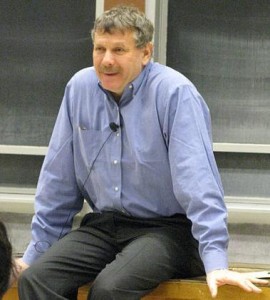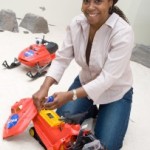 You know these techniques have to do with revealing your whole self at work, the question is: how?
You know these techniques have to do with revealing your whole self at work, the question is: how?
We look to the career path of Dr. Eric Lander, founding director of the Broad Institute of MIT and Harvard, a genetics research center established to help scientists work collaboratively, and whose mission includes discovering the molecular basis of major human diseases. He started out as a math genius, and–good for him–wanted more.
Recently highlighted in the New York Times, Dr. Lander’s work history can serve as a guide on how to find more fulfillment by switching your career track. From his story we gather these top 10 tips for switching careers:
1. Disrespect convention. If you’re working to transform something — be it a whole discipline, or your individual career — traditional norms may get in your way. Dr. Lander relates why the Broad Institute is interdisciplinary at its core:
We used to have these boundaries of the chemistry department in the chemistry building, and the biology department in the biology building, the math department, the computer science department. Young scientists today… have no respect for these boundaries, and they shouldn’t. They just munge it together… people are now exploring the fusion cuisine that comes out across all these different disciplines.
2. Leverage your frustrations. Author Gina Kolata writes:
“I began to appreciate that the career of mathematics is rather monastic,” Dr. Lander said. “Even though mathematics was beautiful and I loved it, I wasn’t a very good monk.” He craved a more social environment, more interactions.
3. Identify all your talents, then use them.
“I found an old professor of mine and said, ‘What can I do that makes some use of my talents?’ ” He ended up at Harvard Business School, teaching managerial economics.
4. Embrace your naivete. So many of us try to hide our inexperience; Lander knows better:
Being hopelessly naive as one is in one’s early twenties, I decided well, I’ll learn about the brain! I realized to learn about the brain, I’d have to learn about cell biology. And to learn about cell biology, I’d have to learn about molecular biology. To learn about molecular biology, I’d have to learn about genetics. That’s how it happened.
5. Don’t disparage yourself. Instead, believe in your potential. A colleague explains:
“He had a sufficiently high opinion of himself,” Dr. Botstein said. “He thought that if anyone could do it, he could. He took a chance and dropped his Harvard job. It was clear that teaching economics would no longer be his career path.”
6. Integrate all of who you are into your work. Lander uses the frames of reference he holds from his multiple roles in life, and his work benefits profoundly:
As a scientist, when you gather information, you do that as a pure scientist. But then as a citizen, as a parent, as just a person in the world, you have an obligation then to ask, “Well, how is that being used in the world?” It means one’s responsiblities don’t just stop at the boundary of the lab. When you go home, you’re still thinking about what’s this impact going to be?
7. When facing problems, stay stubborn. Lander’s years of toiling have brought about expertise on solving challenges:
When you take on a challenge… like what’s the field got to do now? You keep struggling with it, and eventually the structure of the problem becomes clear, and then the path through it becomes clear. All those moments of insight come from long periods of casting about and seeing all the pieces. You just have to be patient enough to wait until all the pieces really fall together. You gotta be stubborn.
8. Eschew your fears. Heading into unknown territory is full of opportunities to fumble, and yet, it’s helpful not to fear them. Regard this brief list of Lander’s achievements:
He teaches freshman biology (a course he never took) at MIT.
[He went] from the most solitary of sciences to forging new sorts of collaborations in a field he never formally studied.
9. It’s OK to be among the first. Are you considering moving into a brand-new field, yet weary about what you don’t know about it? Lander’s been there:
“It is very easy to be an expert in a new field where there are no experts,” Dr. Lander said. “All you have to do is raise your hand.”
10. Persist. Kolata explains:
[His influential] power may have helped when Dr. Lander approached the presidents of Harvard and M.I.T. and proposed creating a permanent institute to continue the collaborative process that groups of scientists had been improvising. At first, he met with resistance, but he persisted.
Thanks to his persistence, the institute has garnered hundreds of millions of dollars including an endowment of $400 million, and boasts a roster of 1,800 collaborating scientists.
Eric Lander clearly knows how to transition to another field with great success. Observe and obey.
Watch Dr. Lander share his words of wisdom:
Image via




Interesting post. Too many high shcool graduates jump right into college because they think that’s what they’re supposed to do. And people wonder why college completion rates are low…Most students who drop out of college do so after only one semester, or at some point during their first year. There are so many options available to students today though that don’t necessarily mean a four-year college. Community colleges, vocational programs, full-time jobs, and might be a better fit for a particular student.